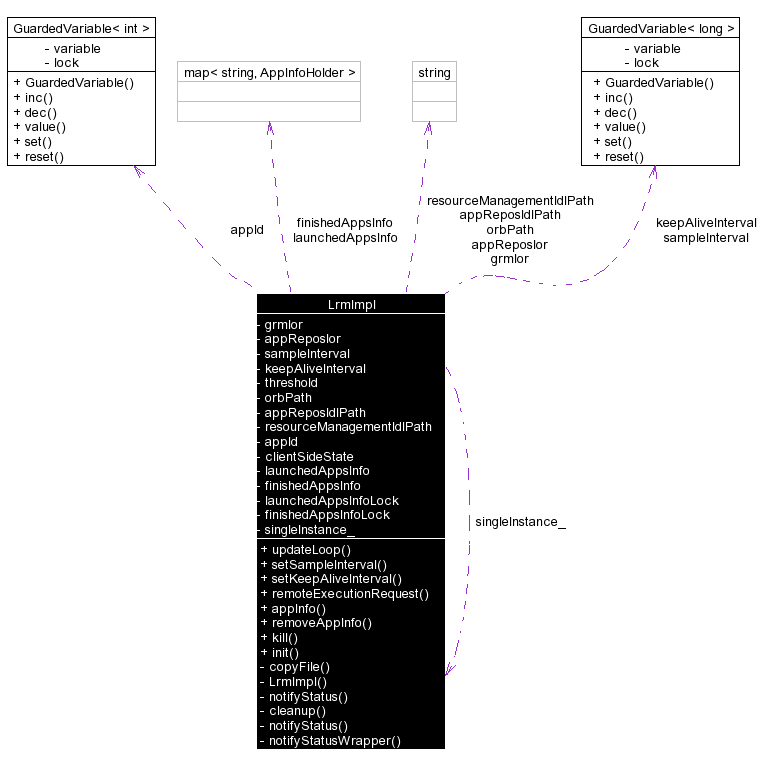LrmImpl Class Reference
#include <LrmImpl.hpp>
Collaboration diagram for LrmImpl:
 [legend]List of all members.
[legend]List of all members.
Detailed Description
LrmImpl - Implementation of the LRM IDL interface.
LrmImpl implements LRM interface. It also hosts methods for setting up the server side of the LRM service (tasks such as ORB instantiation, proxy creation, etc). Finally, LRM periodically uploads resource information of a given node to the GRM.
LRM is a sigleton, because we are using threads and the only way to launch threads are via static methods. We could use other mechanisms to do that, but since we don't need more than one LRM object, this solution is ok for now.
- Author:
- Andrei Goldchleger
- Todo:
- This class was heavily refectored, but maybe further refctoring is possible. Some possibilities include extracting part of the functionality to other classes.
Constructor & Destructor Documentation
| LrmImpl::LrmImpl |
( |
const Config & |
config |
) |
[private] |
|
Member Function Documentation
| void LrmImpl::cleanup |
( |
|
) |
[private] |
|
| void LrmImpl::copyFile |
( |
const string & |
srcPath, |
|
|
const string & |
dstPath |
|
) |
[private] |
|
|
|
Copies a file from srcPath to dstPath
- Parameters:
-
| srcPath | - source path to the file being copied |
| dstPath | - destination path |
|
| void LrmImpl::kill |
( |
const string & |
appId |
) |
|
|
| void LrmImpl::notifyStatus |
( |
|
) |
[private] |
|
| void* LrmImpl::notifyStatus |
( |
void * |
ptr |
) |
[static, private] |
|
| void * LrmImpl::notifyStatusWrapper |
( |
void * |
ptr |
) |
[static, private] |
|
|
|
Called by a GRM asking if we can host a determined application.
- Parameters:
-
| execSpecs | - Data associated with the request(Requirements, preferences...) |
|
| void LrmImpl::removeAppInfo |
( |
const string & |
appId |
) |
[inline] |
|
| void LrmImpl::setKeepAliveInterval |
( |
long |
seconds |
) |
[inline] |
|
|
|
Allows a remote caller to modify the keep-alive interval.
The keep-alive interval defines the maximum time that the LRM can spend without uploading information to the GRM. Even if the system is almost idle and there are no significant changes in resource availability, the LRM uploads resource availability information to the GRM at least every X seconds. This acts as a keep-alive which teels the GRM that a given LRM is still working.
- Parameters:
-
| seconds | - the new keep-alive interval (in seconds). |
|
| void LrmImpl::setSampleInterval |
( |
long |
seconds |
) |
[inline] |
|
|
|
Allows a remote caller to modify the sample interval.
The sample interval defines how many time the system 'sleeps' between two queries about resource utilization made to the OS.
- Parameters:
-
| seconds | - the new sample interval (in seconds). |
|
| void LrmImpl::updateLoop |
( |
|
) |
|
|
|
|
Periodically upload system information to a remote GRM. This method does not return. |
Member Data Documentation
|
|
Holds last used local application Id. Used to rename applications downloaded from the Application Repository, making sure that there is no naming conflicts between multiple applications that might be running |
|
|
Path to the Application Repository IDL |
|
|
The IOR of the Application Repository we will contact |
|
|
Lua state representing LrmImpl's client side |
|
|
The IOR of the GRM we will contact |
|
|
Maximun interval, in seconds, before LRM sends an update to the GRM, even without significat changes in resource availability |
|
|
Path to the O2 files. MUST end with /?. Example: /usr/local/o2/? |
|
|
Path to the Resorce Management IDL. Contains Lrm, Grm and Asct definitions |
|
|
Amount of time, in seconds, between queries about resource availability |
|
|
A percentage that indicates how much resource availability must change in order to be considered significant |
The documentation for this class was generated from the following files:
Generated on Mon Sep 6 16:13:18 2004 by
 1.3.3
1.3.3


 1.3.3
1.3.3